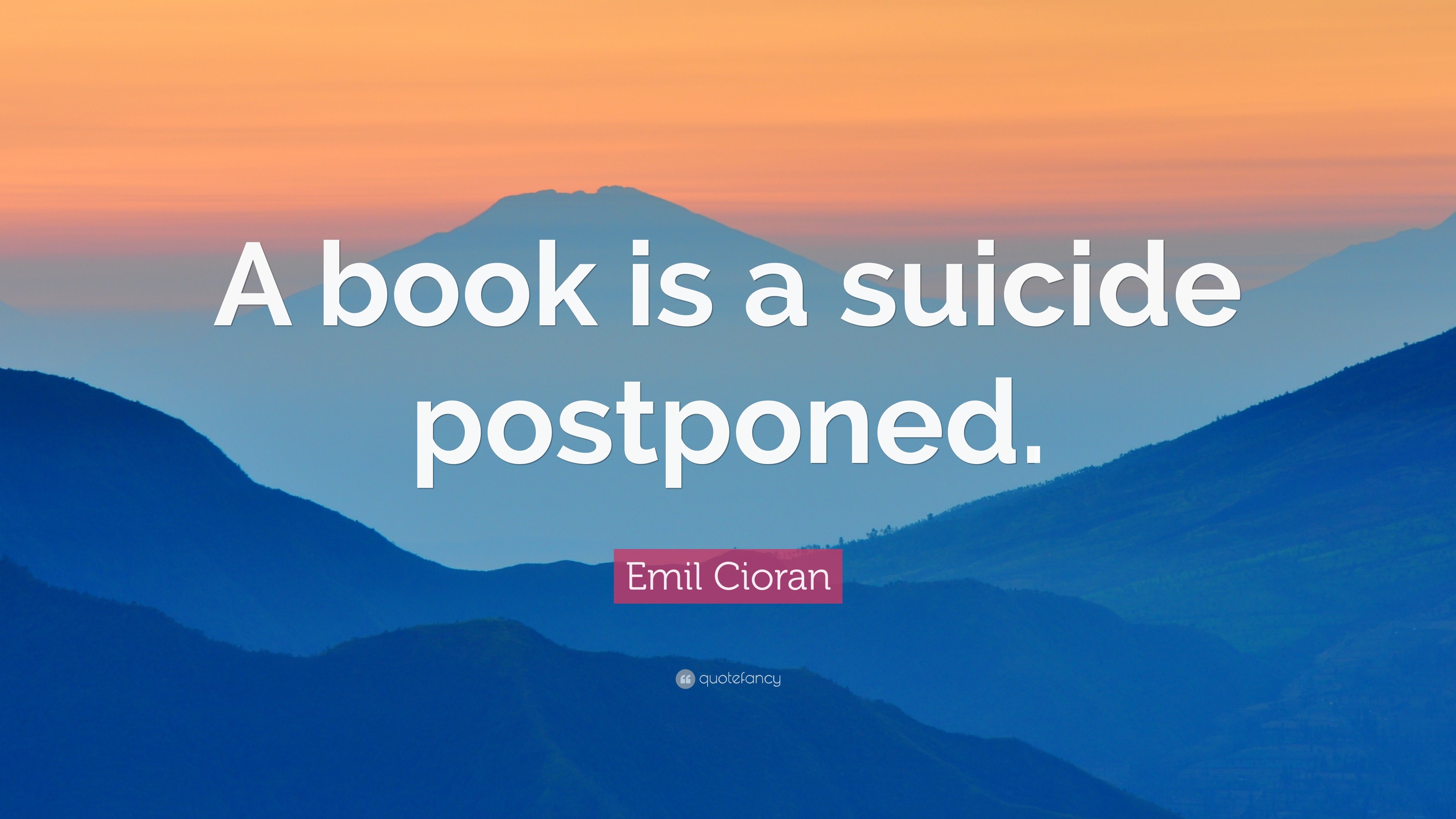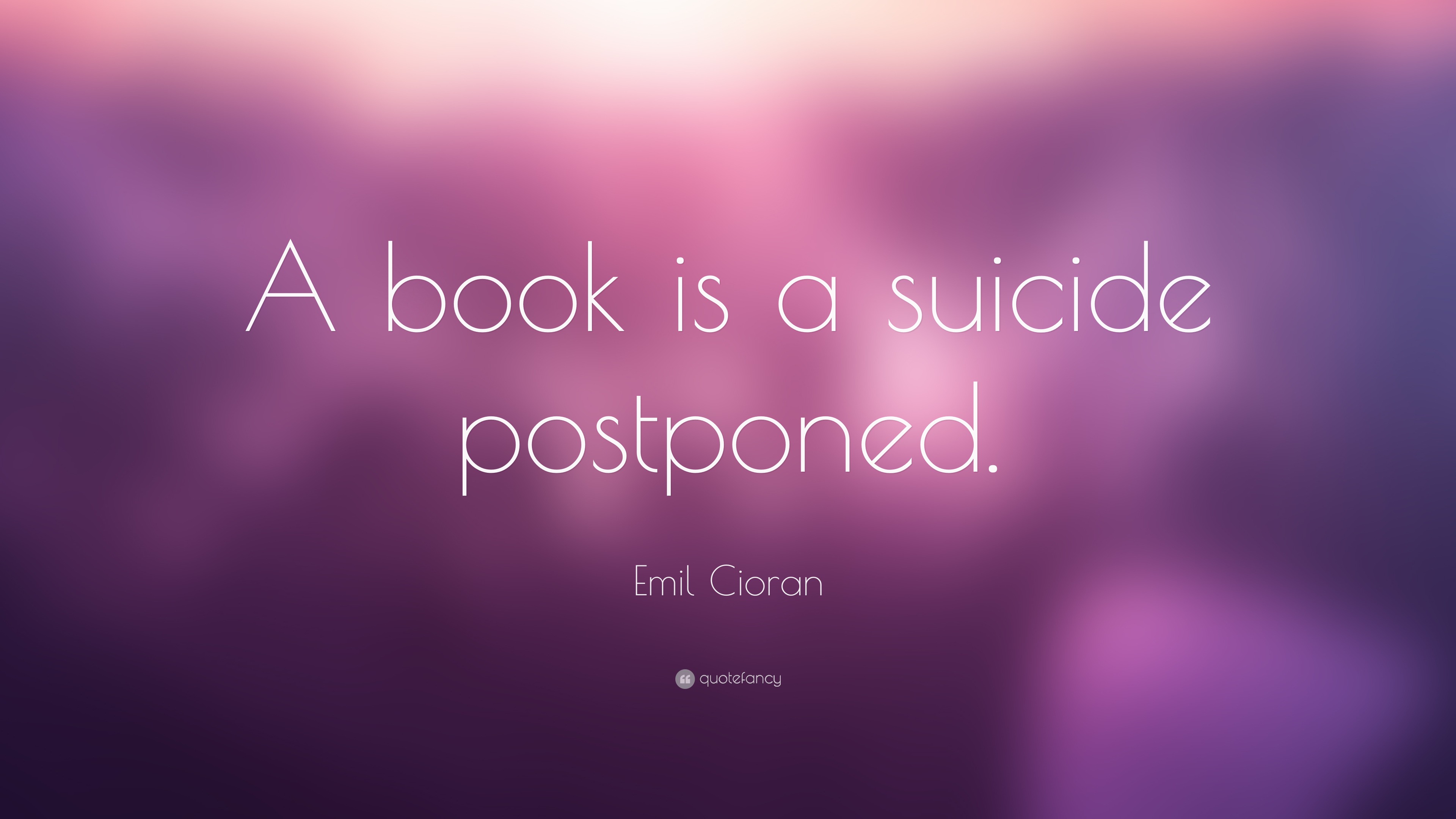Suicide Postponed Meaning: Understanding The Phrase And Its Impact
Let's talk about something heavy, but important. The phrase "suicide postponed" might sound strange or even unsettling at first glance, but it holds a powerful meaning. It’s not just words—it’s a reflection of hope, resilience, and second chances. In today’s world, where mental health is finally getting the attention it deserves, understanding what this phrase means can be life-changing for many. So, buckle up, because we’re diving deep into this topic.
When you hear the term "suicide postponed," your mind might immediately jump to dark places. But here's the thing—it’s not all doom and gloom. This phrase represents a moment when someone decides to pause, reflect, and choose life over despair. It’s about stepping back from the edge and realizing that there’s still time to heal, grow, and find meaning in life.
This article isn’t just about defining a phrase. It’s about shedding light on the struggles people face, the importance of mental health awareness, and how we can support each other. Whether you’re someone who has personally experienced these feelings or you know someone who has, this journey will give you insights, tools, and hope. Let’s get started.
Here’s a quick roadmap of what we’ll cover:
- Understanding the meaning behind "suicide postponed"
- Exploring mental health challenges
- Breaking down the stigma around suicide
- Learning how to support loved ones
- Discovering resources and professional help
What Does Suicide Postponed Really Mean?
Alright, let’s break it down. The phrase "suicide postponed" isn’t just a random combination of words. It refers to a pivotal moment when someone chooses to delay or avoid taking their own life. It’s like hitting the pause button on an overwhelming situation. Instead of giving in to despair, they decide to take a step back and reevaluate their circumstances.
In simpler terms, it’s about choosing hope over hopelessness. It’s about acknowledging that today might be tough, but tomorrow could bring new opportunities and solutions. It’s a powerful reminder that life is worth fighting for, even when it feels like it isn’t.
Why Is This Phrase Important?
This phrase matters because it highlights the complexity of mental health struggles. It shows that suicidal thoughts don’t have to define someone’s future. By postponing suicide, individuals give themselves a chance to seek help, connect with loved ones, and find healthier coping mechanisms.
Think about it like this: life is like a rollercoaster. There are ups and downs, twists and turns. Sometimes, the ride gets so intense that you want to get off. But what if you decided to stay on just a little longer? What if you realized that the next hill might lead to a breathtaking view?
Common Misconceptions About Suicide Postponed
Let’s clear up some misconceptions. Some people might think that "suicide postponed" means the person is just delaying the inevitable. That’s not true. It’s not about putting off the problem—it’s about actively choosing to address it. It’s about saying, “I’m not ready to give up yet.”
Others might assume that someone who postpones suicide is weak or indecisive. Again, that’s far from the truth. It takes immense courage to face those feelings and make the decision to live another day. It’s a testament to their strength and resilience.
Breaking Down the Stigma
Stigma surrounding mental health is real, and it’s one of the biggest barriers people face when seeking help. Society often judges those who struggle with suicidal thoughts, labeling them as flawed or broken. But here’s the thing—mental health is just as important as physical health. We wouldn’t shame someone for having cancer or diabetes, so why do we stigmatize mental illness?
By embracing phrases like "suicide postponed," we can start to shift the narrative. We can create a culture of understanding, empathy, and support. We can let people know that it’s okay to ask for help and that they’re not alone in their struggles.
The Role of Mental Health Awareness
Mental health awareness plays a crucial role in addressing issues like suicide. When people understand the signs, symptoms, and resources available, they’re better equipped to help themselves and others. It’s like having a toolbox full of strategies to tackle life’s challenges.
Here are some key facts about mental health:
- 1 in 5 adults experience mental illness each year
- Suicide is the 10th leading cause of death worldwide
- Only 44% of adults with diagnosable mental health problems receive treatment
These statistics might seem overwhelming, but they also highlight the importance of education and awareness. The more we talk about mental health, the more we can reduce stigma and save lives.
Recognizing Warning Signs
So, how do you know if someone is struggling? Here are some common warning signs to look out for:
- Withdrawal from friends and family
- Increased substance use
- Feelings of hopelessness or worthlessness
- Sudden mood swings
- Talking about death or suicide
If you notice these signs in someone you care about, don’t hesitate to reach out. A simple conversation can make all the difference. You don’t have to have all the answers—just being there can be enough.
How to Support Someone Who Has Postponed Suicide
Now, let’s talk about how you can support someone who has postponed suicide. It’s not always easy, but it’s one of the most meaningful things you can do. Here are some tips:
First, listen without judgment. Sometimes, people just need a safe space to express their feelings. Avoid giving unsolicited advice or minimizing their struggles. Instead, focus on validating their emotions and letting them know you’re there for them.
Next, encourage them to seek professional help. Therapists, counselors, and psychiatrists are trained to provide the support and guidance they need. You can even offer to help them find resources or accompany them to appointments if they’re comfortable with that.
Building a Support System
Having a strong support system is crucial for mental health recovery. Encourage your loved one to connect with friends, family, and support groups. These connections can provide a sense of belonging and reduce feelings of isolation.
Remember, you don’t have to do it all on your own. Reach out to other supportive individuals or professionals if you need help. Taking care of yourself is just as important as taking care of others.
Professional Resources and Treatment Options
When it comes to mental health, there are plenty of resources available. Therapy, counseling, and medication are all effective treatments for managing suicidal thoughts and mental health challenges. Let’s explore some of these options in more detail.
Cognitive-behavioral therapy (CBT) is one of the most widely used forms of therapy for mental health issues. It helps individuals identify and change negative thought patterns and behaviors. Dialectical behavior therapy (DBT) is another option that focuses on emotional regulation and interpersonal skills.
Medication and Its Role
Medication can also play a vital role in mental health treatment. Antidepressants, mood stabilizers, and anti-anxiety medications are commonly prescribed to help manage symptoms. However, it’s important to work closely with a healthcare provider to find the right medication and dosage.
Remember, medication isn’t a one-size-fits-all solution. What works for one person might not work for another. It’s all about finding the right combination of treatments to meet individual needs.
Stories of Hope and Resilience
Hearing stories of hope and resilience can be incredibly inspiring. There are countless individuals who have postponed suicide and gone on to live fulfilling lives. These stories remind us that recovery is possible and that there’s always hope for a brighter future.
Take, for example, the story of Sarah, who struggled with depression and anxiety for years. She reached a breaking point and considered ending her life. But then, she made the decision to postpone suicide and seek help. With the support of her therapist, family, and friends, Sarah learned new coping strategies and rebuilt her life. Today, she’s a mental health advocate, helping others navigate their own struggles.
Learning from Others’ Experiences
Listening to others’ experiences can provide valuable insights and encouragement. It can also help reduce stigma and normalize conversations around mental health. Whether it’s through books, podcasts, or online communities, there are plenty of ways to connect with others who have walked similar paths.
Here are some resources to check out:
Preventing Suicide: A Community Effort
Preventing suicide isn’t just an individual responsibility—it’s a community effort. By working together, we can create a world where everyone feels seen, heard, and valued. Here are some ways you can get involved:
Advocate for mental health policies and funding. Support organizations that provide resources and services for those in need. Educate yourself and others about mental health issues. And most importantly, be kind and compassionate to everyone you meet—you never know what someone is going through.
Creating a Culture of Empathy
Empathy is the key to breaking down barriers and building connections. When we approach others with empathy, we create a safe and supportive environment where people feel comfortable sharing their struggles. It’s about listening, understanding, and responding with compassion.
So, the next time you encounter someone who’s struggling, remember to lead with empathy. A small act of kindness can make a big difference in someone’s life.
Conclusion: Taking Action and Spreading Hope
In conclusion, the phrase "suicide postponed" carries a powerful message of hope and resilience. It reminds us that life is worth fighting for, even when it feels like it isn’t. By understanding the meaning behind this phrase and addressing mental health challenges, we can make a difference in our own lives and the lives of others.
Here’s what you can do moving forward:
- Learn more about mental health and suicide prevention
- Reach out to loved ones who may be struggling
- Support organizations working to end the stigma around mental health
- Practice self-care and prioritize your own mental well-being
Remember, you’re never alone. There are people who care about you and want to help. Whether it’s a friend, family member, or mental health professional, there’s always someone willing to listen. So, take that first step today and choose hope over despair.
And hey, don’t forget to share this article with others. The more we talk about mental health, the more we can create a world where everyone feels supported and valued. Let’s work together to spread hope, one conversation at a time.



Detail Author:
- Name : Valerie Murazik
- Email : ugrant@hotmail.com
- Birthdate : 1998-03-16
- Address : 85513 Maegan Ports North Rosario, AR 40135
- Phone : (680) 768-6777
- Company : Fay, Bauch and Feest
- Job : Compliance Officers
- Bio : Eligendi natus fugiat velit tempore amet magni perspiciatis corrupti. Aperiam dolores et id rerum mollitia saepe. Sequi et vero dolorem sunt rerum aut hic. Perspiciatis ullam laboriosam harum totam.